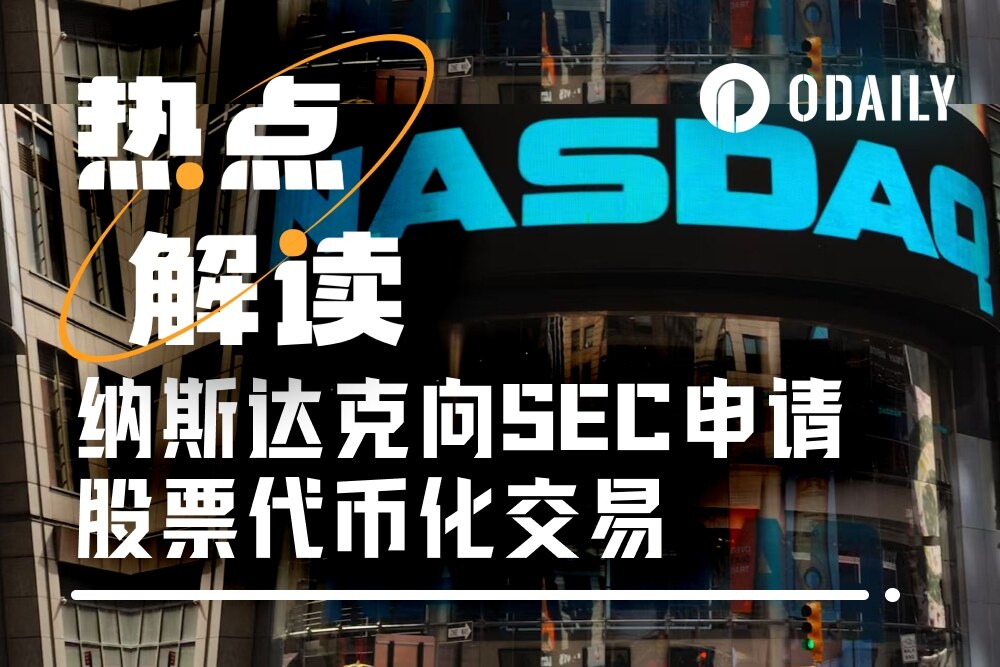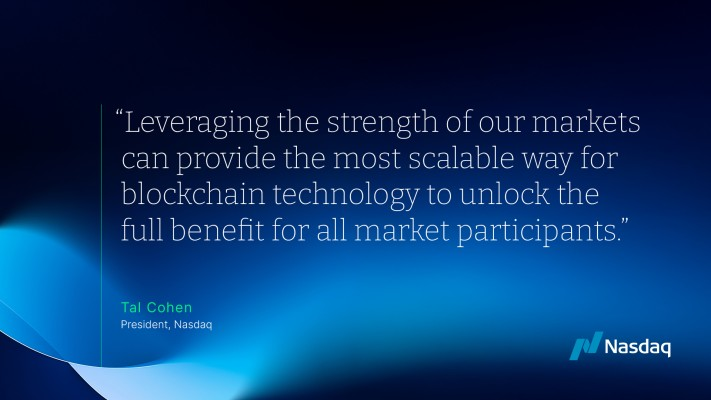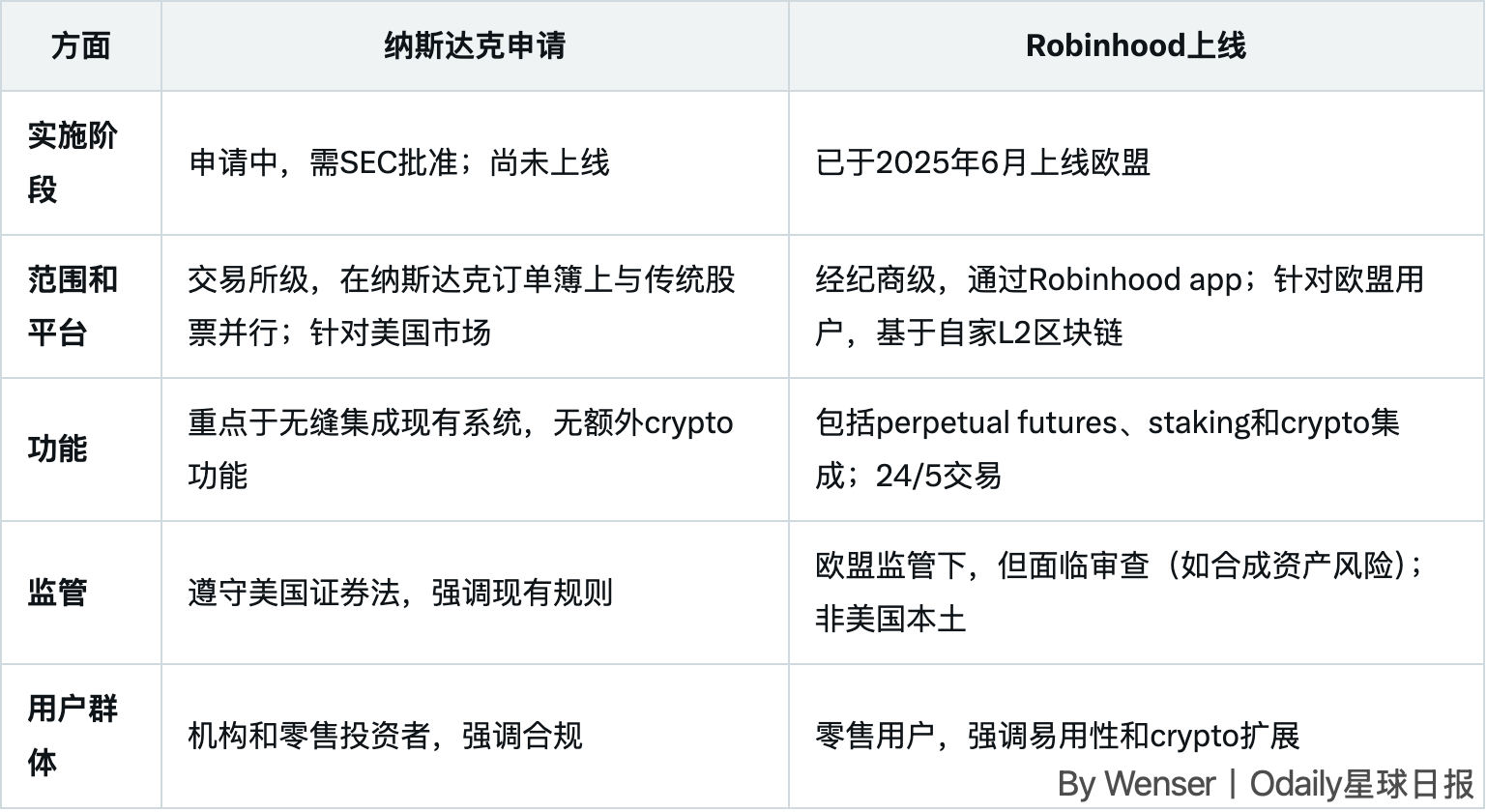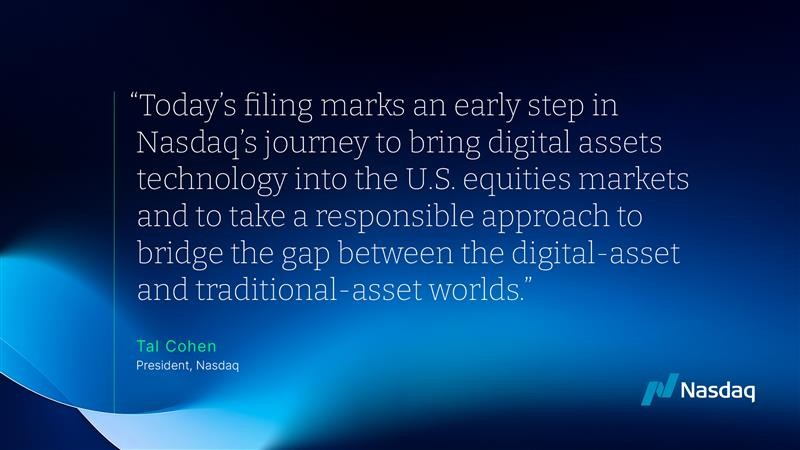Original|Odaily Planet Daily (@OdailyChina)

Following Robinhood's launch of stock tokens in the European market, the American stock exchange Nasdaq has officially submitted an application for stock tokenization trading to the U.S. SEC.
Nasdaq President Tal Cohen stated in a LinkedIn post: “Combining tokenization technology, blockchain technology, and traditional market infrastructure provides an excellent development opportunity for the global financial system, promising profound benefits for issuers, investors, and the global economy by reducing friction, shortening settlement times, automating processes, and improving capital and collateral management efficiency.”
If this application is approved, on-chain tokenized stock trading will also enjoy rights such as dividend distribution, proxy voting, and clear legal regulatory rights. Odaily Planet Daily will provide a brief analysis of this milestone event for readers' reference.
TradFi Exchanges Actively Seek Change, Nasdaq Sparks Tokenized Securities Trading Boom
It is worth noting that the news of “Nasdaq submitting an application for tokenized securities trading to the U.S. SEC” did not emerge from formal official documents but rather from a post by Nasdaq President Tal Cohen on LinkedIn. On one hand, this may relate to confidentiality requirements regarding the application documents; on the other hand, it may also reflect Nasdaq's somewhat cautious official stance on the matter.
After all, aside from regulatory compliance, there are still specific technical implementation plans, trading time rules, and specific funding settlement plans that need to be confirmed for Nasdaq to launch tokenized stocks.
Nevertheless, as one of the largest stock exchanges in the world today, Nasdaq's move is undoubtedly a “milestone event” in the industry.
Nasdaq's Ambition: To Ascend to New Heights with Stock Tokenization
According to publicly available data, Nasdaq's total trading volume is estimated to be around 49.2 billion shares in 2024; in the first half of 2025, its total trading volume is estimated to be around 26.2 billion shares. Media reports indicate that the trading volume of individual investors on Nasdaq in the first half of 2025 reached a staggering $6.6 trillion. Additionally, according to data released by Dealogic, in the first half of 2025, Nasdaq's IPO (including SPAC IPOs) raised approximately $21.3 billion, while the NYSE's figure was only $8.7 billion, indicating that the former is undoubtedly the dominant player in the U.S. stock market.
Such a massive trading volume and extraordinary market position naturally call for more innovative trading participation methods and diversified investment targets, which may be one of the reasons why Nasdaq has high hopes for stock tokenization.

Nasdaq's Statement: Aligning with the U.S. SEC's “Project Crypto” Initiative
Aside from its own development needs, Nasdaq's application for stock tokenization trading may also have considerations of “proactive expression.”
Previously, U.S. SEC Chairman Paul Atkins explicitly stated that asset tokenization is a major priority for the SEC. The regulatory agency formed a working group earlier this year to advance this matter during a series of cryptocurrency roundtable meetings held earlier this year. A key component of the SEC's main initiative, Project Crypto, is to clear the path for a world-leading tokenized securities market.
On May 12 of this year, Paul Atkins publicly stated: “The transition of securities from off-chain systems to on-chain systems is akin to the transition of recordings from analog vinyl records to cassette tapes and then to digital software decades ago. The migration to on-chain securities has the potential to reshape every aspect of the securities market by enabling entirely new methods of issuing, trading, owning, and using securities.”
When it comes to sensing trends, one should never underestimate the sensitivity and quick response capabilities of an organization and seasoned veterans who have been deeply involved in traditional finance for decades.
New Stock Tokenization Solutions: Nasdaq Offers a Different Approach from Robinhood
Regarding the specific stock tokenization plan proposed by Nasdaq, we can understand it from the following three aspects:
First, in terms of trading priority, tokenized stocks will align with traditional stock trading. “The fact that an order includes tokenized securities or indicates a preference for settling and clearing securities in token form will not affect the priority of the exchange in executing that order. In this new system, already digitized stock trades will be recorded through a digital ledger that ‘provides a novel function for recording securities ownership and transaction evidence.’”
Second, in terms of specific implementation plans, if Nasdaq launches tokenized stocks, it will clear and settle token transactions through The Depository Trust Co. (DTC), which was established in 1973 and settles transactions worth hundreds of trillions of dollars annually. Additionally, Nasdaq plans to offer exchange-related trading products, such as ETFs, which will begin operating “after establishing the necessary infrastructure and trading settlement services at DTC.”
Third, in terms of product investor rights, investors purchasing tokenized stock products will receive all rights associated with the relevant stocks, including voting rights and liquidation rights; and regulated custodians will ensure that shareholders receive dividends.
In addition to the above advantages that integrate both TradFi and DeFi, Nasdaq President Tal Cohen also emphasized: “(Stock tokenization) should not come at the expense of the resilience, security, and good governance currently present in the U.S. stock market. Therefore, we are prepared to collaborate with existing and new providers of critical trade infrastructure services to innovate while maintaining the foundational trust principles that support the market.” In other words, the tokenized stock products that Nasdaq plans to launch will still strictly adhere to U.S. securities laws and compliance requirements.
Nasdaq vs. Robinhood: Different Progress, Levels, Markets, and User Groups
Specifically comparing Nasdaq's plan with the stock tokenization products previously launched by Robinhood, Nasdaq's solution is undoubtedly more “concise,” though it can also be said to be “old wine in a new bottle” or “same soup, different herbs.” Below is a brief comparison of the two products—

In summary, Nasdaq is merely adding a “tokenized wrapper” to traditional “stocks,” and through a new system, Nasdaq has achieved a non-Crypto Native “tokenization solution.” In the short term, this move will introduce a certain number of traditional financial investors and liquidity into the crypto market; in the long term, stock tokenization will provide diversified trading targets for the crypto market while also opening the door to “U.S. stock investment” for investors from around the world.

Perhaps in the near future, the realization of RWA will not only involve the digitization and monetization of real-world assets into crypto assets but will also include the assetization and physicalization of crypto assets into the real world.
免责声明:本文章仅代表作者个人观点,不代表本平台的立场和观点。本文章仅供信息分享,不构成对任何人的任何投资建议。用户与作者之间的任何争议,与本平台无关。如网页中刊载的文章或图片涉及侵权,请提供相关的权利证明和身份证明发送邮件到support@aicoin.com,本平台相关工作人员将会进行核查。




